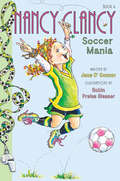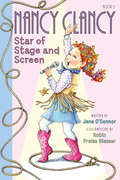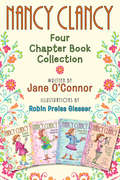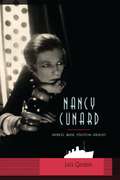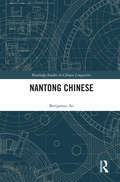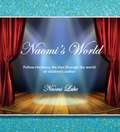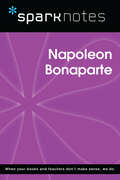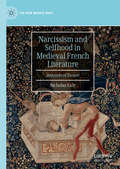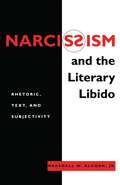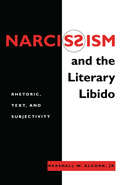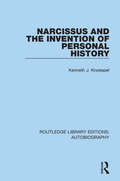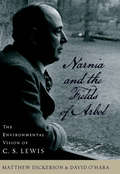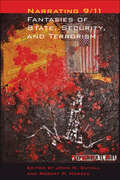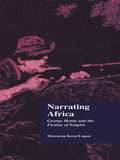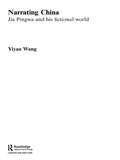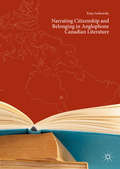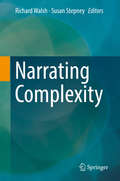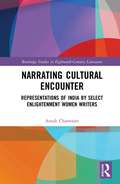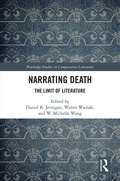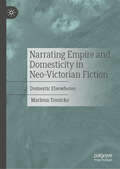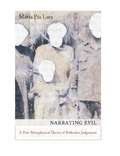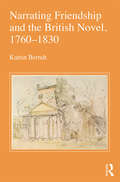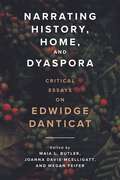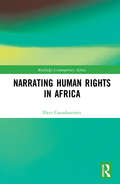- Table View
- List View
Nancy Clancy, Soccer Mania (I Can Read! #6)
by Jane O'Connor Robin Preiss GlasserNancy Clancy takes the field in New York Times bestselling team Jane O'Connor and Robin Preiss Glasser's sixth Nancy Clancy chapter book. <P><P>Normally Nancy doesn't like dressing like everyone else. But wearing a soccer team uniform--well, that's different. Nancy adores being on the Green Goblins--she loves cheering for her teammates, sharing refreshments, and painting her fingernails bright green before every game. <P>If only she wasn't cursed with slow legs! All Nancy wants is to be mediocre--or maybe even a little better than average. Will she reach her goal? <P> Here's a brand-new chapter book with plenty of humor and sports action, written expressly for kids like Nancy who aren't the star of their team. Fans of Fancy Nancy will love joining Nancy Clancy in the latest edition to the chapter book series!
Nancy Clancy, Star of Stage and Screen (I Can Read! #5)
by Jane O'Connor Robin Preiss GlasserNancy Clancy is ready for her close-up in the fifth chapter book in the Nancy Clancy chapter book series by the New York Times bestselling team of Jane O'Connor and Robin Preiss Glasser.It's <P><P>Nancy's time to shine as she takes center stage in the school play! There's no way Nancy will get stuck in the chorus again this year--she's been practicing guitar for months and her audition was superb. So when Nancy gets a callback, she's overwhelmed with joy! <P>But after Nancy's performance during the play is captured on a video that gets posted on YouTube, it seems her stardom has gone viral. Will Nancy's humiliation get the best of her, or will she find a way to embrace her newfound fame? <P>Fans of Nancy Clancy will enjoy watching Nancy sparkle in the spotlight in her latest chapter book. The central theme of all the Nancy Clancy books shines through, showing the power of positive thinking.
Nancy Clancy: Four Chapter Book Collection
by Jane O'Connor Robin Preiss GlasserSassy Fancy Nancy is now a detective! Kids who grew up with Jane O'Connor's Fancy Nancy picture books can spend some quality time with their BFF because Nancy Clancy is now starring in her own chapter books! This collection includes the first four Nancy Clancy mysteries.Nancy Clancy, Super Sleuth: When one of Nancy's classmate's most special possessions disappears from school, it's up to her to save the day. With the help of her friend Bree, she follows the clues to an unexpected source.Nancy Clancy, Secret Admirer: Nancy and Bree decide to play matchmaker, but nothing works out as planned. Will love conquer all in the end?Nancy Clancy Sees the Future: Nancy thinks she may be able to read the future . . . and all signs point to her being a true clairvoyant (that's fancy for a fortune-teller). Does Nancy really have special powers, or is it all just a coincidence?Nancy Clancy, the Secret of the Silver Key: Nancy buys an old desk at a tag sale and soon finds out that someone left behind a key. Nancy and Bree set out to unlock the secret of the silver key in the hopes of finding some treasure along the way. But unlocking the mystery soon proves to be more difficult than they had thought, and when the answer isn't what they had expected, Nancy and Bree learn there are some things that remain timeless forever.
Nancy Cunard: Heiress, Muse, Political Idealist
by Lois GordonLois Gordon's absorbing biography tells the story of a writer, activist, and cultural icon who embodied the dazzling energy and tumultuous spirit of her age, and whom William Carlos Williams once called "one of the major phenomena of history."Nancy Cunard (1896-1965) led a life that surpasses Hollywood fantasy. The only child of an English baronet (and heir to the Cunard shipping fortune) and an American beauty, Cunard abandoned the world of a celebrated socialite and Jazz Age icon to pursue a lifelong battle against social injustice as a wartime journalist, humanitarian aid worker, and civil rights champion.Cunard fought fascism on the battlefields of Spain and reported firsthand on the atrocities of the French concentration camps. Intelligent and beautiful, she romanced the great writers of her era, including three Nobel Prize winners, and was the inspiration for characters in the works of Ezra Pound, T. S. Eliot, Aldous Huxley, Pablo Neruda, Samuel Beckett, and Ernest Hemingway, among others. Cunard was also a prolific poet, publisher, and translator and, after falling in love with a black American jazz pianist, became deeply committed to fighting for black rights. She edited the controversial anthology Negro, the first comprehensive study of the achievement and plight of blacks around the world. Her contributors included Langston Hughes, W. E. B. Du Bois, and Zora Neale Hurston, among scores of others.Cunard's personal life was as complex as her public persona. Her involvement with the civil rights movement led her to be ridiculed and rejected by both family and friends. Throughout her life, she was plagued by insecurities and suffered a series of breakdowns, struggling with a sense of guilt over her promiscuous behavior and her ability to survive so much war and tragedy. Yet Cunard's writings also reveal an immense kindness and wit, as well as her renowned, often flamboyant defiance of prejudiced social conventions.Drawing on diaries, correspondence, historical accounts, and the remembrances of others, Lois Gordon revisits the major movements of the first half of the twentieth century through the life of a truly gifted and extraordinary woman. She also returns Nancy Cunard to her rightful place as a major figure in the historical, social, and artistic events of a critical era.
Nancy Hale: On the Life and Work of a Lost American Master (Unsung Masters Series)
by Dan Chaon Phong NguyenNancy Hale (1908-1988) began publishing short stories in The New Yorker in the 1930s, and her career spanned the next fifty years. Her novel The Prodigal Women was a runaway bestseller in 1942. Yet today Nancy Hale is nearly forgotten. This collection of seven short stories and numerous critical essays seeks to bring Hale's work to today's readers. Though she writes about an effete group of characters - wealthy, artistic women from New England or Virginia - Hale captures the joys and sadness of the human condition.
Nantong Chinese (Routledge Studies in Chinese Linguistics)
by Benjamin AoNantong Chinese is an in-depth account of an interesting and endangered Sinitic language spoken in Nantong, China, in an area in the Northern Yangtze River Delta about 800 square kilometers in size and 105 kilometers northwest of the city of Shanghai. The Chinese language consists of several hundred local varieties known as Sinitic languages or Chinese dialects, each representing a unique linguistic system. This book offers a comprehensive and systematic insight into one such system that is even more complex and more interesting than standard Mandarin. The unique vocalization and other linguistic features of Nantong Chinese make it unintelligible to most Chinese people. All the important linguistic aspects of Nantong Chinese are covered, including its phonetic, lexical, morphological and syntactic subsystems. Nantong Chinese will be of interest to professionals and students in linguistics worldwide.
Naomi's World: Follow Harmony the Hen through the world of children’s author Naomi Lake
by Naomi LakeThis book, brought to you by Carers WA, dives into the challenges young people may have with disabilities. No matter what you face in life or the challenges it brings you, stay strong and never give up on your dreams. Naomi is a children's author in Albany, Western Australia who has published two books about Harmony the Hen. She is also an ambassador for Down Syndrome WA. "Being a role model for others and encouraging children to read and write is a passion of mine because it has opened up the world for me. I love learning and trying new things whenever I have the opportunity. You just have to go out to explore the world because the world won’t come to you.”
Napoleon Bonaparte (SparkNotes Biography Guide)
by SparkNotesNapoleon Bonaparte (SparkNotes Biography Guide) Making the reading experience fun! SparkNotes Biography Guides examine the lives of historical luminaries, from Alexander the Great to Virginia Woolf. Each biography guide includes:An examination of the historical context in which the person lived A summary of the person&’s life and achievements A glossary of important terms, people, and events An in-depth look at the key epochs in the person&’s career Study questions and essay topics A review test Suggestions for further reading Whether you&’re a student of history or just a student cramming for a history exam, SparkNotes Biography guides are a reliable, thorough, and readable resource.
Narcissism and Selfhood in Medieval French Literature: Wounds of Desire (The New Middle Ages)
by Nicholas EalyThis book offers analyses of texts from medieval France influenced by Ovid’s myth of Narcissus including the Lay of Narcissus, Alain de Lille’s Plaint of Nature, René d’Anjou’s Love-Smitten Heart, Chrétien de Troyes’s Story of the Grail and Guillaume de Machaut’s Fountain of Love. Together, these texts form a corpus exploring human selfhood as wounded and undone by desire. Emerging in the twelfth century in Western Europe, this discourse of the wounded self has survived with ever-increasing importance, informing contemporary methods of theoretical inquiry into mourning, melancholy, trauma and testimony. Taking its cue from the moment Narcissus bruises himself upon learning he cannot receive the love he wants from his reflection, this book argues that the construct of the wounded self emphasizes fantasy over reality, and that only through the world of the imagination—of literature itself—can our narcissistic injuries seemingly be healed and desire fulfilled.
Narcissism and the Literary Libido: Rhetoric, Text, and Subjectivity
by Marshall W. Alcorn, Jr.What is it that makes language powerful? This book uses the psychoanalytic concepts of narcissism and libidinal investment to explain how rhetoric compels us and how it can effect change. The works of Joseph Conrad, James Baldwin, Michael Foucault, Jacques Derrida, Arthur Miller, D.H. Lawrence, Ben Jonson, George Orwell, and others are the basis of this thoughtful exploration of the relationship between language and subject. Bringing together ideas from Freudian, post- Freudian, Lacanian, and post-structuralist schools, Alcorn investigates the power of the text that underlies the reader response approach to literature in a strikingly new way. He shows how the production of literary texts begins and ends with narcissistic self-love, and also shows how the reader's interest in these texts is directed by libidinal investment.Psychoanalysts, psychologists, and lovers of literature will enjoy Alcorn's diverse and far-reaching insights into classic and contemporary writers and thinkers.
Narcissism and the Literary Libido: Rhetoric, Text, and Subjectivity (Literature And Psychoanalysis Ser. #6)
by Marshall W. Jr.What is it that makes language powerful? This book uses the psychoanalytic concepts of narcissism and libidinal investment to explain how rhetoric compels us and how it can effect change. The works of Joseph Conrad, James Baldwin, Michael Foucault, Jacques Derrida, Arthur Miller, D.H. Lawrence, Ben Jonson, George Orwell, and others are the basis of this thoughtful exploration of the relationship between language and subject. Bringing together ideas from Freudian, post- Freudian, Lacanian, and post-structuralist schools, Alcorn investigates the power of the text that underlies the reader response approach to literature in a strikingly new way. He shows how the production of literary texts begins and ends with narcissistic self-love, and also shows how the reader's interest in these texts is directed by libidinal investment.Psychoanalysts, psychologists, and lovers of literature will enjoy Alcorn's diverse and far-reaching insights into classic and contemporary writers and thinkers.
Narcissus and the Invention of Personal History (Routledge Library Editions: Autobiography #3)
by Kenneth J. KnoespelOriginally published in 1985. This investigation of Ovid’s fable takes a different tack to previous studies of the love lyric or the themes but looks at the creation of narrative strategies to explain Narcissus’ experience. The story has always been understood as literally impossible but invites readers to ask what is meant by the puzzling tale of deception and death. The limits placed on the fable by the commentaries of the medieval period allow us to appreciate the narrative expansion of the fable in twelfth and thirteenth-century poetry. Themes in this book are the way the fable is used as a means for knowledge of physical nature and the development of science; the importance of language in the fable and in its settings when rewritten in other texts, and psychoanalytic aspects of Echo and Narcissus. The fable has the capacity to represent mental life and psychological crisis within other narratives and this is also an important discussion point, based around the medieval text Roman de la Rose. The book also considers the wider Metamorphoses and Ovid’s importance for literature.
Narnia and the Fields of Arbol: The Environmental Vision of C.S. Lewis (Culture of the Land #Cull)
by Matthew Dickerson David O'HaraAn exploration of the Chronicles of Narnia and the Space Trilogy that &“enriches our understanding of how to care for our world&” (Alan Jacobs, author of Breaking Bread with the Dead). In Narnia and the Fields of Arbol: The Environmental Vision of C. S. Lewis, authors Matthew Dickerson and David O&’Hara illuminate an important yet overlooked aspect of the author&’s visionary work. They go beyond traditional theological discussions of Lewis&’s writing to investigate themes of sustainability, stewardship of natural resources, and humanity&’s relationship to wilderness. The authors examine the environmental and ecological underpinnings of Lewis&’s work by exploring his best-known works of fantasy, including the seven books of the Chronicles of Narnia and the three novels collectively referred to as the Space Trilogy. Taken together, these works reveal Lewis&’s enduring environmental concerns, and Dickerson and O&’Hara offer a new understanding of his pioneering style of fiction. Narnia and the Fields of Arbol, the first book-length work on the subject, finds the author&’s legacy to have as much in common with the agrarian environmentalism of Wendell Berry as it does with the fantasy of J. R. R. Tolkien. In an era of increasing concern about deforestation, climate change, and other environmental issues, Lewis&’s work remains as pertinent as ever. The widespread adaption of his work in film lends credence to the author&’s staying power as an influential voice in both fantastical fiction and environmental literature. With Narnia and the Fields of Arbol, Dickerson and O'Hara have written a timely work of scholarship that offers a fresh perspective on one of the most celebrated authors in literary history. &“Both revelatory and a pleasure to read.&” —Robert Siegel, award-winning author of The Whalesong Trilogy
Narrating 9/11: Fantasies of State, Security, and Terrorism (A <I>Modern Fiction Studies</I> Book)
by John N. Duvall Robert P. Marzec.Contemporary fiction takes on 9/11, interrogating the global expansion of surveillance based on fantasies of US national security.Winner of the CHOICE Outstanding Academic Title of the Choice ACRLNarrating 9/11 challenges the notion that Americans have overcome the national trauma of the terrorist attacks on the World Trade Center and the Pentagon. The volume responds to issues of war, surveillance, and the expanding security state, including the Bush Administration’s policies on preemptive war, extraordinary rendition, torture abroad, and the suspension of privacy rights and civil liberties at home.Building on the work of Giorgio Agamben, Slavoj Žižek, and Donald Pease, the contributors focus on the ways in which post-9/11 narratives help make visible the fantasies that attempt to justify the ongoing state of exception and American exceptionalism. Narrating 9/11 examines a variety of contemporary narratives as they relate to the cultural construction of the neoliberal nation-state, a role that mediates the possibilities of ethnic and religious identity as well as the ability to imagine terrorism. Touching on some of the mainstays of 9/11 fiction, including Jonathan Safran Foer’s Extremely Loud & Incredibly Close and John Updike’s Terrorist, the book expands this particular canon by considering the work of such writers as Jess Walter, William Gibson, Lauren Groff, Ken Kalfus, Ian McEwan, Philip Roth, John le Carré, Laila Halaby, Michael Chabon, and Jarett Kobek. Narrating 9/11 pushes beyond a critical focus on domestic realism, offering chapters that examine speculative and genre fiction, postmodernism, climate change, and the evolving security state, as well as the television series Lost and the film Paradise Now.
Narrating Africa: George Henty and the Fiction of Empire (Children's Literature and Culture #9)
by Mawuena Kossi LoganFirst published in 1999. Routledge is an imprint of Taylor & Francis, an informa company.
Narrating China: Jia Pingwa and his Fictional World (Routledge Contemporary China Series #Vol. 9)
by Yiyan WangJia Pingwa, whose novels have caused both fame and controversy, has an enormous readership throughout the Chinese speaking world. However, despite Pingwa's cultural significance and the use of his poetry, novels and prose in schools and universities, there has never been any substantial academic study of the writer and his writings. Filling that gap, this book examines the corpus of Pingwa’s writing and emphasizes his importance, prominence and relevance to contemporary Chinese society. This pioneering study discusses Pingwa's works in the light of ‘cultural nationalism’, showing how he links the cultural identity of China with the cultural authenticity of his local Shaanxi Province. In addition, the book highlights issues of nationalism in contemporary Chinese literature and underpins the significance of regional writing in negotiating China’s national identities.
Narrating Citizenship and Belonging in Anglophone Canadian Literature
by Katja SarkowskyThis book examines how concepts of citizenship have been negotiated in Anglophone Canadian literature since the 1970s. Katja Sarkowsky argues that literary texts conceptualize citizenship as political “co-actorship” and as cultural “co-authorship” (Boele van Hensbroek), using citizenship as a metaphor of ambivalent affiliations within and beyond Canada. In its exploration of urban, indigenous, environmental, and diasporic citizenship as well as of citizenship’s growing entanglement with questions of human rights, Canadian literature reflects and feeds into the term’s conceptual diversification. Exploring the works of Guillermo Verdecchia, Joy Kogawa, Jeannette Armstrong, Maria Campbell, Cheryl Foggo, Fred Wah, Michael Ondaatje, and Dionne Brand, this text investigates how citizenship functions to denote emplaced practices of participation in multiple collectives that are not restricted to the framework of the nation-state.
Narrating Complexity
by Richard Walsh Susan StepneyThis book stages a dialogue between international researchers from the broad fields of complexity science and narrative studies. It presents an edited collection of chapters on aspects of how narrative theory from the humanities may be exploited to understand, explain, describe, and communicate aspects of complex systems, such as their emergent properties, feedbacks, and downwards causation; and how ideas from complexity science can inform narrative theory, and help explain, understand, and construct new, more complex models of narrative as a cognitive faculty and as a pervasive cultural form in new and old media. The book is suitable for academics, practitioners, and professionals, and postgraduates in complex systems, narrative theory, literary and film studies, new media and game studies, and science communication.
Narrating Cultural Encounter: Representations of India by Select Enlightenment Women Writers (Routledge Studies in Eighteenth-Century Literature)
by Arnab ChatterjeeThis book interrogates and historicises eighteenth-century British women writers’ responses to India through the novel and travel writing to bring out the polyvalent space arising out of their complex negotiation with the colonial discourse. Though British women enjoyed their privileged racial status as the utilisers of colonial riches, they articulated their voice of dissent when they faced the politics of subordination in their own society and identified them with the marginalised status of the colonised Indians. This brings out the complicity and critique of the colonial discourse of British women writers and foregrounds their ambivalent responses to the colonial project. This book provides detailed textual analysis of the works of Phebe Gibbes, Elizabeth Hamilton, Lady Morgan, Jemima Kindersley and Eliza Fay through critical insights from the idea of the Enlightenment, postcolonial theory and feminist thought. It also foregrounds new perspectives to colonial discourse vis-à-vis the representation of India by locating the dialogic strain within the British narratives about India.
Narrating Death: The Limit of Literature
by Daniel K. Jernigan Walter Wadiak Michelle WangDrawing on literary and visual texts spanning from the twelfth century to the present, this volume of essays explores what happens when narratives try to push the boundaries of what can be said about death.
Narrating Empire and Domesticity in Neo-Victorian Fiction: Domestic Elsewheres
by Marlena TronickeFiction classified as &‘neo-Victorian&’ has steadily emerged as a crucial mode of British cultural production. It is no coincidence that this most recent Victorian renaissance is taking shape in a climate of widespread empire nostalgia, with imperial-colonial legacies being relegated to a distant &‘elsewhere.&’ In its critical re-visitations of the nineteenth century, neo-Victorianism has the potential to intervene in this often selective memory of Britain&’s imperial past. Nevertheless, systematic re-readings of empire have so far played a comparatively minor role in neo-Victorian scholarly debate. This monograph addresses this lacuna by examining how neo-Victorianism negotiates constructions of empire in conjunction with the domestic. Drawing on a range of neo-Victorian novels as well as their Victorian intertexts and bringing these into dialogue with postcolonial theory, it asks how neo-Victorian fiction engages with, perpetuates, or subverts Victorian imaginaries of urban British &‘centres&’ in opposition to remote imperial &‘margins.&’ It examines why domesticity – broadly understood as ideologically charged concepts of family, home, and belonging based on formations of gender, sexuality, and class – can never be constituted independently of empire. In addition, the book raises questions regarding neo-Victorianism&’s larger potentiality of narrating empire, suggesting that it is precisely the disorienting moments that constitute a characteristically neo-Victorian mode of exploring the entanglements of empire and domesticity.
Narrating Evil: A Postmetaphysical Theory of Reflective Judgment (New Directions in Critical Theory #20)
by Maria LaraConceptions of evil have changed dramatically over time, and though humans continue to commit acts of cruelty against one another, today we possess a clearer, more moral way of analyzing them. In Narrating Evil, María Pía Lara explores what has changed in our understanding of evil, why the transformation matters, and how we can learn from this specific historical development.Drawing on Immanuel Kant's and Hannah Arendt's ideas about reflective judgment, Lara argues that narrative plays a key role in helping societies acknowledge their pasts. Particular stories haunt our consciousness and lead to a kind of examination and dialogue that shape notions of morality. A powerful description of a crime can act as a filter, helping us to draw conclusions about what constitutes a moral wrong, and public debates over these narratives allow us to construct a more accurate picture of historical truth, leading to a better understanding of why such actions are possible.In building her argument, Lara considers Greek tragedies, Shakespeare's depictions of evil, Joseph Conrad's literary metaphors, and movies that portray human cruelty. Turning to such philosophers and writers as Jürgen Habermas, Walter Benjamin, Primo Levi, Giorgio Agamben, and Ariel Dorfman, Lara defines a reflexive relationship between an event, the narrative of the event, and the public reception of the narrative, and she proves that the stories of perpetrators and sufferers are always intertwined.The process of disclosure, debate, and the public fashioning of collective judgment are vital methods through which we make sense not only of new forms of cruelty but of past crimes as well. Narrating Evil describes the steps of this process and why they are a crucial part of our attempt to build a different, more just world.
Narrating Friendship and the British Novel, 1760-1830
by Katrin BerndtFriendship has always been a universal category of human relationships and an influential motif in literature, but it is rarely discussed as a theme in its own right. In her study of how friendship gives direction and shape to new ideas and novel strategies of plot, character formation, and style in the British novel from the 1760s to the 1830s, Katrin Berndt argues that friendship functions as a literary expression of philosophical values in a genre that explores the psychology and the interactions of the individual in modern society. In the literary historical period in which the novel became established as a modern genre, friend characters were omnipresent, reflecting enlightenment philosophy’s definition of friendship as a bond that civilized public and private interactions and was considered essential for the attainment of happiness. Berndt’s analyses of genre-defining novels by Frances Brooke, Mary Shelley, Sarah Scott, Helen Maria Williams, Charlotte Lennox, Walter Scott, Jane Austen, and Maria Edgeworth show that the significance of friendship and the increasing variety of novelistic forms and topics represent an overlooked dynamic in the novel’s literary history. Contributing to our understanding of the complex interplay of philosophical, socio-cultural and literary discourses that shaped British fiction in the later Hanoverian decades, Berndt’s book demonstrates that novels have conceived the modern individual not in opposition to, but in interaction with society, continuing Enlightenment debates about how to share the lives and the experiences of others.
Narrating History, Home, and Dyaspora: Critical Essays on Edwidge Danticat
by Thadious M. DavisContributions by Cécile Accilien, Maria Rice Bellamy, Gwen Bergner, Olga Blomgren, Maia L. Butler, Isabel Caldeira, Nadège T. Clitandre, Thadious M. Davis, Joanna Davis-McElligatt, Laura Dawkins, Megan Feifer, Delphine Gras, Akia Jackson, Tammie Jenkins, Shewonda Leger, Jennifer M. Lozano, Marion Christina Rohrleitner, Thomás Rothe, Erika V. Serrato, Lucía Stecher, and Joyce White Narrating History, Home, and Dyaspora: Critical Essays on Edwidge Danticat contains fifteen essays addressing how Edwidge Danticat’s writing, anthologizing, and storytelling trace, (re)construct, and develop alternate histories, narratives of nation building, and conceptions of home and belonging. The prolific Danticat is renowned for novels, collections of short fiction, nonfiction, and editorial writing. As her experimentation in form expands, so does her force as a public intellectual. Danticat’s literary representations, political commentary, and personal activism have proven vital to classroom and community work imagining radical futures. Among increasing anti-immigrant sentiment and containment and rampant ecological volatility, Danticat’s contributions to public discourse, art, and culture deserve sustained critical attention. These essays offer essential perspectives to scholars, public intellectuals, and students interested in African diasporic, Haitian, Caribbean, and transnational American literary studies. This collection frames Danticat’s work as an indictment of statelessness, racialized and gendered state violence, and the persistence of political and economic margins. The first section of this volume, “The Other Side of the Water,” engages with Danticat’s construction and negotiation of nation, both in Haiti and the United States; the broader dyaspora; and her own, her family’s, and her fictional characters’ places within them. The second section, “Welcoming Ghosts,” delves into the ever-present specter of history and memory, prominent themes found throughout Danticat’s work. From origin stories to broader Haitian histories, this section addresses the underlying traumas involved when remembering the past and its relationship to the present. The third section, “I Speak Out,” explores the imperative to speak, paying particular attention to the narrative form with which such telling occurs. The fourth and final section, “Create Dangerously,” contends with Haitians’ activism, community building, and the political and ecological climate of Haiti and its dyaspora.
Narrating Human Rights in Africa (Routledge Contemporary Africa)
by Eleni CoundouriotisNarrating Human Rights in Africa claims human rights from the perspective of artists from the African continent and situates the key theoretical concepts in African perspectives, undercutting the stereotypes of victimhood and voicelessness. Instead of positioning literary texts as illustrative of points already theorized elsewhere, the author foregrounds the literature itself to show the concepts it offers, the ideas and responses stemming from complex historical circumstances in Africa and expressed by African writers. The book focuses on how narrative creates new categories of thought challenging human rights dogma, whereas the sum of the literary voices evoked also stands by the values of social justice and protection of human rights. The chapters take up key challenges to the narration of human rights in which the contribution of African writers is particularly important. This includes human dignity in the resistance to apartheid, the figure of the child soldier, how humanitarianism’s images affect representational strategies of contemporary African writers, the challenge of testifying about rape in war, how to evoke the disappeared body of the torture victim, the centrality of flight in the refugee and migrant experiences, and finally the long shadow of the "heart of darkness" motif. Offering a sustained examination of the narrative treatment of key human rights concerns as expressed by African writers, this book will be of interest to scholars of African literature, postcolonial studies, African studies, and human rights.
